Ukraine conflict: Could the fighting spread across Europe? And other questions
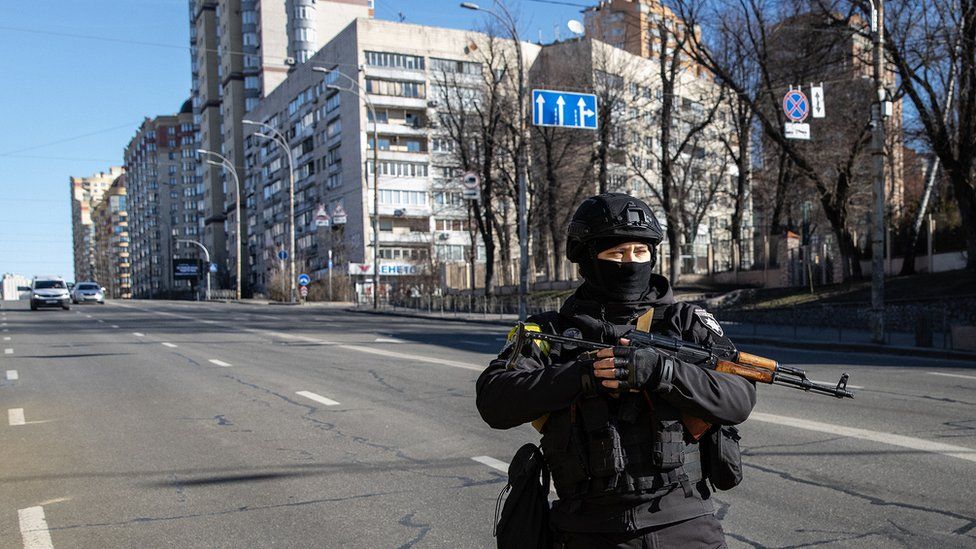 Image source, Getty Images
Image source, Getty ImagesRussian troops are trying to take Ukraine's two biggest cities, Kyiv and Kharkiv, but are meeting stiff resistance.
Meanwhile, an estimated half a million refugees have fled Ukraine, and in Russia, heavy sanctions have begun to bite.
As the situation intensifies, two of the BBC's reporters on the ground answer your questions.
- The BBC's chief international correspondent Lyse Doucet is in Kyiv, Ukraine's capital
- Mark Lowen is on the Poland-Ukraine border
Are the countries around Russia and part of Nato safe, for how long? - Cristina Onofras, Romania
Mark Lowen writes:
Nato's eastern flank countries, bordering Ukraine, are worried.
Lithuania declared a state of emergency. Sweden and Finland - though neither of them Nato members - joined the alliance's emergency summit last week, and the US has increased its troop numbers in countries like Poland.
Some Poles I've spoken to near the border feel anxious about their own security - but their primary focus remains on helping Ukrainian friends or relatives on the other side or those who have fled here.
At what point will the countries of Nato agree enough is enough and put boots on the ground to support Ukraine? - Tim Mepham, Brighton
Lyse Doucet writes:
Nato countries and allies are watching Russia's every move, warning that their defensive military alliance will do everything to defend "every inch" of their territory.
They've sent weapons and ammunition to Ukraine, and trained Ukrainian soldiers in recent years - indeed right up to the Russian invasion.
But they've repeatedly said there will be no Nato "boots on the ground" because Ukraine is not a Nato member.
However, this changes if Russia moves beyond Ukraine into a Nato country
Article 5 of Nato's constitution states that "an attack against one ally is considered an attack against all allies."
If that happens, the world moves into uncharted territory and there's a dangerous possibility of a Nato-Russia confrontation.
What are the chances of Putin bombing the UK? - Becky, Weymouth
Lyse Doucet writes:
I am so sorry that you have to ask this terrible and terrifying question. I would want to answer, no chance.
These are unpredictable, unfathomable times but I would still like to believe the answer is no - no to the bombing of Britain or any other country. And a hope that the bombing of Ukraine is swiftly brought to an end.
How are the people in shelters getting food, water, and sanitation needs met? Is there any food available in Kyiv at this time? - Arlene, Oregon, USA
Lyse Doucet writes:
When the curfew lifts, and air raids sirens go silent, people nervously rush to the shops - if the shops are open, and the shelves still have supplies.
We hear from metro stations turned refuges that people are coming together to help each other. But when curfews remain in force for 36 hours, food and water starts running short. Some residents moved into local hotels.
They're also doing what they can to keep people fed. There's a great community spirit - everyone is pitching in, including international and local organisations. But the concern is if this goes on too long that even finding food will be hard.
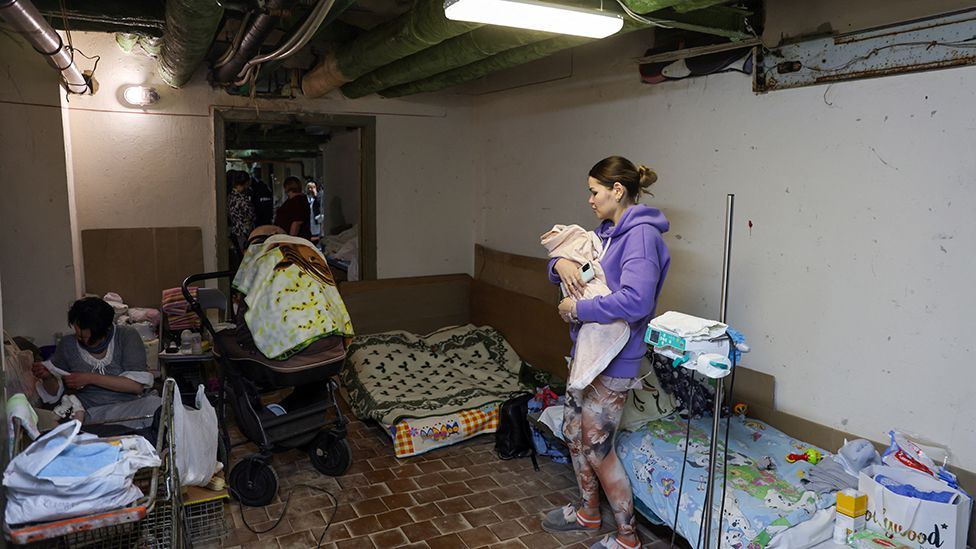 Image source, Getty Images
Image source, Getty ImagesHow and when will the military aid promised by various western nations arrive in Ukraine? How could western nations accelerate the delivery of this needed aid? - Christophe Borgia, Quebec
Mark Lowen writes:
Some military aid has already been sent. Poland has sent ammunition across the border, the US has already sent in some 90 tonnes of military assistance, Sweden is breaking with its tradition of not sending weapons to countries engaged in armed conflict, and now the EU has, for the first time ever, agreed to finance the purchase and delivery of weapons to a country under attack.
In terms of how it will be accelerated, Poland has offered to be a logistics hub for the deployment. Western nations are acutely aware of the need to quicken this, with Ukraine concerned that it's running out of ammunition.
Is the Russian military holding back their full ability, or are the logistics-based issues they're having actually preventing them from conquering Ukraine? - John, USA
Lyse Doucet writes:
Sitting in Kyiv, many thought that the sight of Russian troops in the heart of this capital was just a matter of time - they counted it in hours. But Ukrainian forces are resisting, and Russian forces are said to still be about 30km (18.6 miles) from the city centre.
With every day, more of the combat troops and heavy weaponry marshalled along Ukraine's borders move forward in all directions, but not as fast or as far as many expected.
It's hard to say whether or not it is not "going according to plan" because no one knows what President's Putin plan is. But there've been reports of Russian convoys running out of fuel, Russian soldiers losing the will to fight, and Ukrainians fighting back - both soldiers and civilians, some armed only with the force of patriotism.
There's also been heavy street-to-street fighting in areas including the second largest city of Kharkiv. And Russian troops have been advancing and attacking - against the north-eastern city of Chernihiv and the southern city of Maripul, among many others.
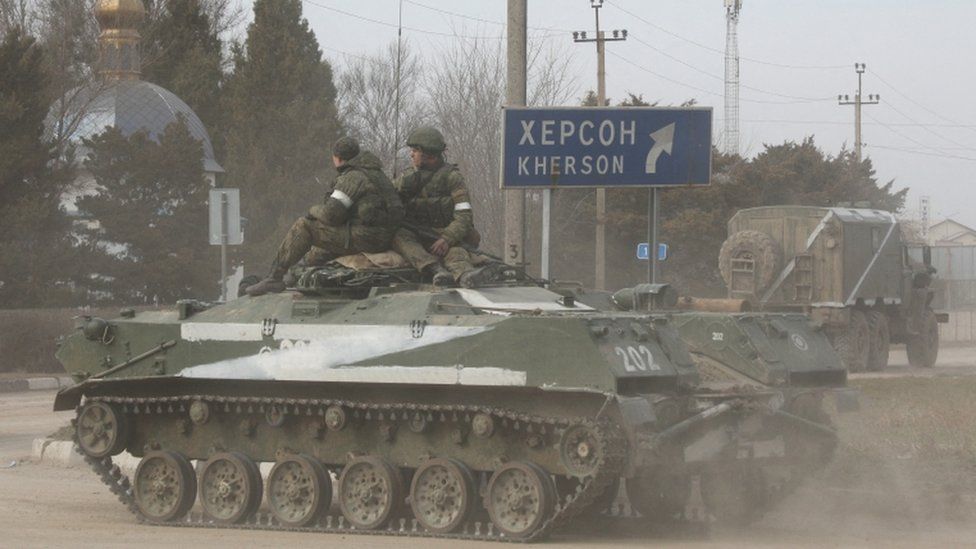 Image source, Reuters
Image source, ReutersHow many foreign fighters have joined Ukraine in response to its president's call? - George Menachery, Kerala, India
Mark Lowen writes:
It's unclear for now. Ukraine's President has urged foreigners to join what he called an "international brigade" but we don't know the numbers of those who've responded.
Ukraine's embassy in Israel issued a Facebook post appealing for Israelis to travel to Ukraine to fight, but it was later deleted.
If Russia manages to take over Ukraine, what's next? - Nhlanhla, South Africa
Lyse Doucet writes:
That is an existential question for Ukraine, a defining and dangerous moment for the world.
First, Russian forces would have to seize far larger swathes of territory of Europe's second-largest country, including the capital Kyiv, a city of nearly three million people known to be resolutely pro-European and pro-Nato.
History tells us military coups and invasions have conquered by taking over television stations and presidential palaces. That's not going to be enough.
There would be a ferocious counter-attack, and a Ukrainian insurgency would quickly rise. Support would pour in from many directions, many sources, and of many kinds. It's hard to imagine that takeover would survive. It would go down in history as the darkest of dark hours.
Does anyone know why Russia chose now to attack/invade Ukraine, rather than doing so a year ago or two years ago, or next year? Was there a "triggering" factor to cause it to happen now? - Anna, Hawaii
Lyse Doucet writes:
That is an important question and we still don't have all the answers. This war is often called President Putin's war - it's widely believed he is the one driving it and no one is clear how far he is able and willing to go to try to control a neighbour he says shouldn't exist as a country.
Many ask if he sensed a weakness in the Nato alliance, in the United States in particular, after the messy debacle of the troop pull-out from Afghanistan and a Taliban takeover.
Many also speculate about the Russian leader's state of mind after the isolation and anxiety of the pandemic.
Has any country in the entire world actually sent any of their troops to help the Ukraine? - Thomas Ogren, San Luis, USA
Mark Lowen writes:
Not officially. No Nato member wants to risk a direct military confrontation between its troops and those of Russia. President Biden, for example, has repeatedly stated that there will be no American troops fighting in Ukraine.
But we don't know if there are foreigners there, covertly working with the Ukrainian army, particularly in light of the calls from Ukraine's president for foreigners to go and help.
What do the Russian-speaking Ukrainians think about the current Russian invasion of Ukraine? - Man Chun Siu, London
Lyse Doucet writes:
We saw some scenes of celebration in areas of eastern Ukraine which have been controlled by Russian-backed separatists since 2014.
Some evacuees from this region told BBC colleagues of their happiness that Russia recognised Donetsk and Luhansk. But it is hard to know how much of a welcome there was.
Life became much harder for residents in these areas in the past eight years - they've been cut off from their families, even their pensions.
Speaking Russian does not mean pro-Russian. Many Ukrainians speak both languages, including President Zelensky.
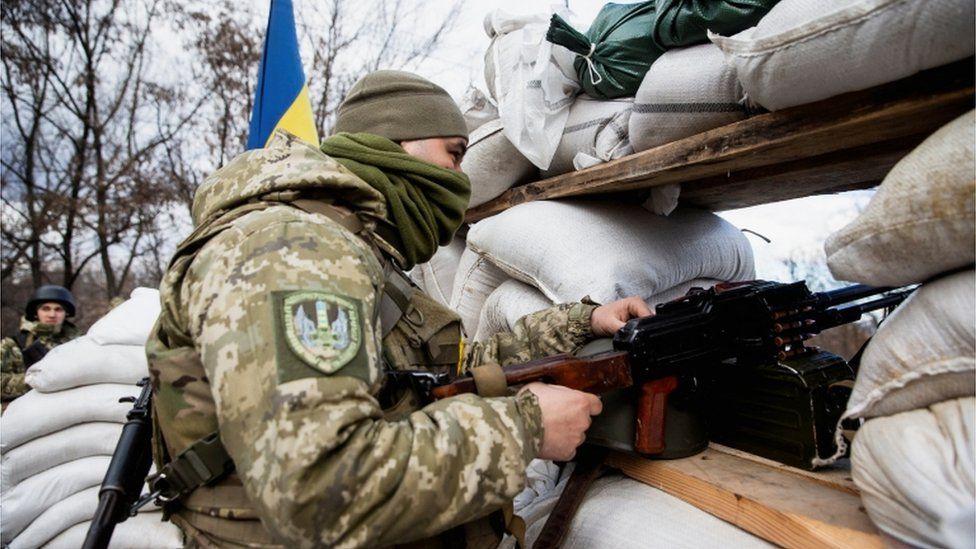 Image source, Reuters
Image source, ReutersWhy do the US and EU believe that sanctions alone can deter Putin? - Aragorn, London
Lyse Doucet writes:
The threats against Ukraine, and now the war against Ukraine have jolted the world. We've seen in recent days a slow but certain toughening of sanctions, restrictions, actions by countries and organisations worldwide that are unparalleled.
As Russia invaded Ukraine, a first tranche of sanctions came into force in one capital after another. They were welcomed by Ukrainians but mocked too as simply not sufficient. And indeed, they didn't change President Putin's mind.
The West is now waking up to Russia's resolve to occupy Ukraine. Some sanctions will take weeks, even months to bite, but some are now hitting Russia's currency, stocks, the wealth of the rich oligarchs and sadly the lives of the poorest.
How will the promised essential supplies and weaponry make it to the frontlines given the superiority of Russian air power? - Andy Sheridan (via Twitter)
Mark Lowen writes:
It's all going in through Ukraine's western border - principally Poland. Military flights have arrived here from as far afield as the US and Canada and it's then largely being driven across the border, due in part to the threat from Russian air power.
Ukrainian airspace remains closed to civilian flights. Some military aid is arriving here in Poland by train too, including from the Czech Republic.
It's an enormous logistical operation to resupply Ukraine's military.
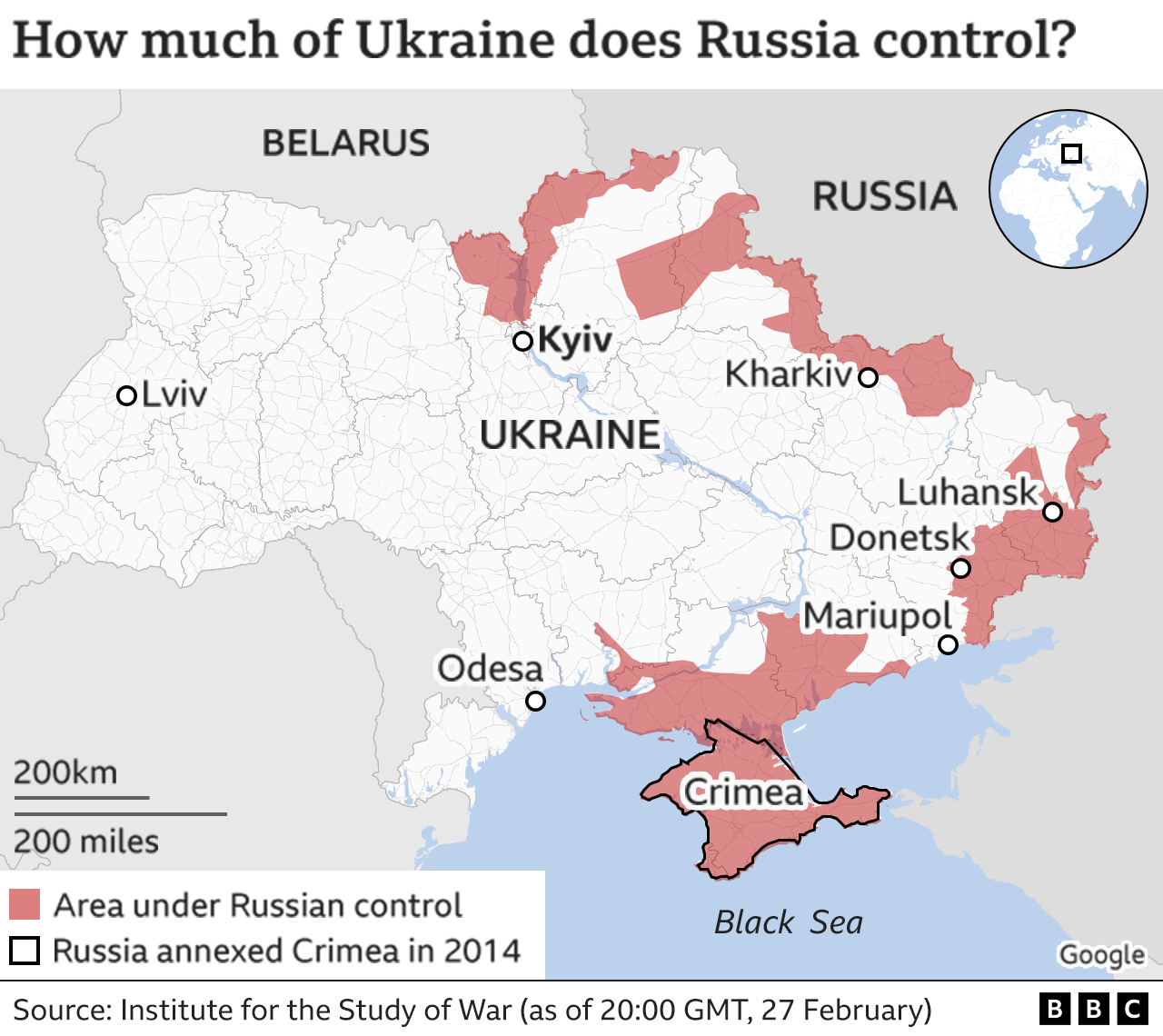

Russia attacks Ukraine: More coverage
- LIVE: Latest updates from on the ground
- THE BASICS: Why is Putin invading Ukraine?
- MAPS: Tracking day five of Russia's invasion
- IN DEPTH: Full coverage of the war



No comments